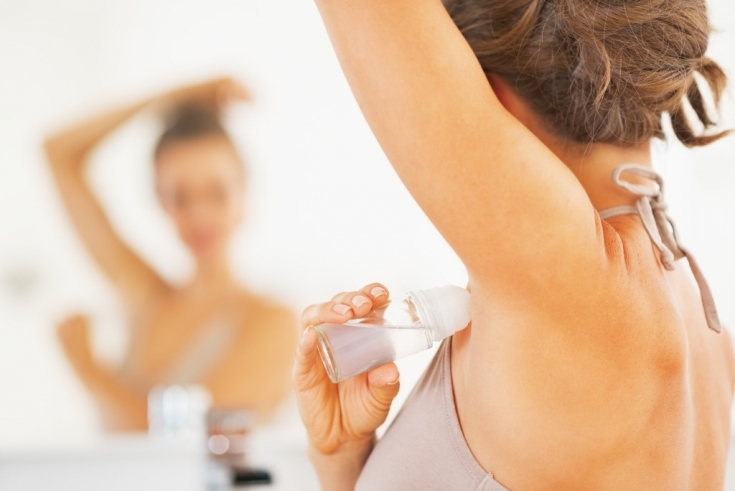Shop shelves are full of various products that promise us "sweat protection", "odor protection" for "24", "48", "72 hours", do not leave marks and "yellow spots". How to understand this variety of deodorants and antiperspirants? Of course, it is easier to plunge into the Internet and get information from it. However, it is easy to get lost in such a variety of information. That is why in this article a stylist-makeup artist, bioecologist and teacher of the Carpathian National University Vasilina Pavlyuk will tell you about the main differences between deodorants and antiperspirants, so that you choose the most beneficial remedy for the smell of sweat.
Underarm sweat odor remedy: what is the difficulty of choosing
There is a lot of information out there about the dangers of deodorants and antiperspirants. Opponents of antiperspirants say that these drugs contribute to the violation of sweating, lead to inflammation of the sweat glands and breast cancer.
But the opponents of deodorants urge us to get rid of the latter, because the alcohol in them leads to itching and pigmentation. Here a rhetorical question arises: "What to do next?"
Maybe throw away all these products and use the technique of the men of Ancient Rome, who carried bags of aromatic herbs under their arms? But in this case, we will have to forget about tight-fitting dresses and trendy shirts, and give preference exclusively to oversized clothes. This prospect is not encouraging.
Deodorant: features of action and debunking of myths
Let's look at how deodorants and antiperspirants work and whether they really cause such damage to health, as their opponents write about them.
The difference between these types of funds is quite simple and understandable, and it lies in the component composition and, accordingly, in the method of action of the agent itself.
Let's take a closer look at each of them separately.
1. Deodorant contains antibacterial ingredients that fight underarm sweat odor. The latter occurs when bacteria begin to actively develop in the humid environment of the armpits, one of the waste products of which is the smell.
Using deodorant won't keep you from getting wet armpits, but it's a good sweat odor remedy. Sometimes the composition of the deodorant also includes the active ingredient – triclosan. It acts on both negative and positive bacterial flora of the body.
This is why deodorant opponents are screaming at the top of their lungs about the dangers of using triclosan deodorants. In fact, this is a myth that was refuted by the Scientific European Union.
Thus, the content of triclosan in deodorants at a concentration of 0.3% is considered safe. This is a fairly small, but extremely effective dose for neutralizing pathogenic microflora.
2. Also, for those people who don't like the words "alcohol" in deodorants, there are special ingredients – esters of vegetable acids, for example esters of citric acid. They are "alternative" food for bacteria. On such a "diet" bacteria do not emit an unpleasant odor.
3. There are many myths that antiperspirants cause Alzheimer's disease, disrupt the body's water metabolism, or lead to breast cancer. The relationship between the use of these drugs and the above diseases has not been clinically established.
Antiperspirant: what you need to know about this antiperspirant
When choosing an antiperspirant, we need to know the following:
- This is a remedy that inhibits perspiration.
- It contains aluminum compounds. It is due to the fact that aluminum salts easily polymerize under the influence of the pH of the body that the main effect of the antiperspirant – the mouths of the sweat glands are superficially clogged.
- In case of very strong sweating, the blockage of the mouth of the sweat glands by the antiperspirant is leveled.
- The same happens when taking water procedures with soap.

How to choose a sweat odor remedy: expert advice
So, summing up all of the above, we can draw the following conclusions and give some useful tips that will help you make a choice between antiperspirant and deodorant.
- If you don't sweat a lot, you can safely use regular deodorant.
- You should train without additional protection, that is, without antiperspirant, deodorant can be used. Earlier we wrote about how to reduce the possible damage of the gym to the skin.
- If you are not a fan of alcohol-based deodorants, choose the alternative – deodorants containing citric acid esters.
- Be aware that active ingredients such as citrus oil and alcohol can cause pigmentation when exposed to the sun.
- If you have just shaved, do not use odor or sweat protection products, as active ingredients can enter the bloodstream through damaged skin. And this is not their main purpose.
Antiperspirant should not be used immediately after a shower. In this case, the ducts of the sweat glands are still filled with water and it will not work. Wipe dry, wait half an hour and feel free to use an antiperspirant.
- If you suffer from excessive sweating – hyperhidrosis, you might be better off using an antiperspirant (rather than deodorant) or see a beautician for a botulinum toxin injection.
As you can see, deodorant and antiperspirant have fundamental differences and deodorant – safer personal care product. Following the recommendations of a specialist, you will be able to choose the best remedy for the smell of sweat for yourself, which will not harm your health and will please you with the result.
Read also faces






Add a comment